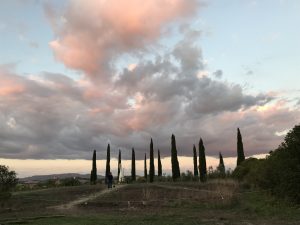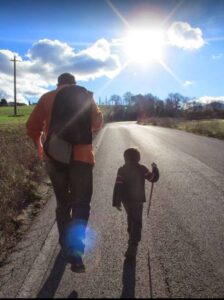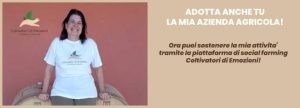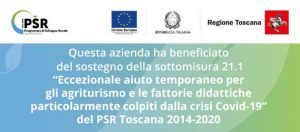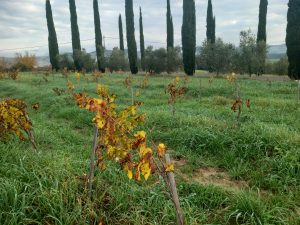 The vine is part of the family of deciduous plants, i.e. those plants that lose all their leaves between autumn and winter and enter a state of vegetative rest, in which the vital processes slow down considerably.
The vine thus finds itself sister to plants such as the highly fragrant and spectacular Budleja, the smooth and white Noce, and centenary Bagolaro "Spaccasassi", plants which, if it were not for this particularity, you would never have said that they have such a common destiny. All three excel in our garden and on the farm, and this certainly unites them.
Winter is a very important month in the countryside. For those who live in the city, it is a cold month, and it is certainly an underrated season. For us winemakers who live with our plants in the countryside, the cold is as important as the heat. Indeed, we are very worried if it doesn't arrive, or arrives too late.
With the cold, the vine falls into a phase of physiological rest called "dormancy": the plant, after having lost its leaves, reduces its metabolic function (a bit like us during the Christmas period, where it becomes crucial to eat panettone).
For the plant it is a crucial period for its survival, it protects itself from frost damage and dormancy favors energy recovery
The vine is part of the family of deciduous plants, i.e. those plants that lose all their leaves between autumn and winter and enter a state of vegetative rest, in which the vital processes slow down considerably.
The vine thus finds itself sister to plants such as the highly fragrant and spectacular Budleja, the smooth and white Noce, and centenary Bagolaro "Spaccasassi", plants which, if it were not for this particularity, you would never have said that they have such a common destiny. All three excel in our garden and on the farm, and this certainly unites them.
Winter is a very important month in the countryside. For those who live in the city, it is a cold month, and it is certainly an underrated season. For us winemakers who live with our plants in the countryside, the cold is as important as the heat. Indeed, we are very worried if it doesn't arrive, or arrives too late.
With the cold, the vine falls into a phase of physiological rest called "dormancy": the plant, after having lost its leaves, reduces its metabolic function (a bit like us during the Christmas period, where it becomes crucial to eat panettone).
For the plant it is a crucial period for its survival, it protects itself from frost damage and dormancy favors energy recoveryWhen I travel for work, I like to listen to the radio. Radio still has many more creative possibilities than television, and it’s incredible! also on the web! First of all it’s fantastic entertainment in the car – which can’t be instagram or facebook – I listened to the interview with the architect Paola Viganò, who wrote an interesting book, it’s called “the biopolitical gardens”.
Why am I talking to you here about this book?
Because basically the architect says something that escapes us, but is very important: that in the city we try to create something new, more eco-sustainable, greener, closer to our idea of the ideal, but unfortunately we still have old parameters in our heads, and that therefore, we risk camouflaging our cities, but then we don’t change anything substantial. Because all the paradigms linked to the “old” modern city influence us.
Among the old paradigms that still influence us, there is still one that contrasts city life with that of the countryside.
In the 1970s, as a child, I came to Statiano to thresh with my father, or with my uncle and my cousins and spend Sundays.
The regional road 68 was state road and much narrower, to travel it from Cecina it took a good, good hour and you couldn’t take it from the center of Cecina, but only from San Pietro in Palazzi, a small hamlet further north.
Yet, it was the most immediate road that connected the Florentines to Castiglioncello, to the sea, but they didn’t take it into consideration because they took the motorway.
From Ponteginori, we took the provincial road 47, which was a 5 kilometer dirt road, all stones and potholes, and which had to be traveled with a certain tranquility. To cover 5 kilometres, it took us half an hour.
And here’s what we found once we arrived: first thing,
-Roberto and Mirella and Roberto’s parents, who have worked in the family business for many years;
-Mirella’s chickens, who laid eggs of all colours
– Roberto’s mother’s goats, with their milk, made a fantastic cheese that she kept in the cupboard together with the very fragrant bread that she always made,
-5 fat rabbits that were in the hutch,
-the water from the well that needed to be pumped,
-a generator for electricity
-, the hay when it was in season on which we climbed onto the bales and then slid along its bales, or jumped from one bale to another.
– Mirella’s desserts, delicacies made with the eggs of her chickens and which she affectionately prepared for us.
-The fireplace, which we lit with wood from the forest.
– a sour wine, in large one and a half liter bottles, with oil on the surface to be removed with stubble or cotton. A wine that lasted a maximum of 8 months, and which was bright red, but very dense and tannic.
-Extra virgin olive oil, tasty, spicy, where you can dip the bread.
In 2000, when my husband and I came to live here, many things were changing, and others remained the same.
The road has changed: it is regional, it is larger and more accessible, less wild. Now many tourists pass by from Florence and the province to go to the seaside.
Even the provincial road is now asphalted, and you can reach Statiano in 5 minutes from the village of Ponteginori. The water arrives with the ASA and the electricity with the Enel poles. Some nearby towns are heated with steam.
For years we worked side by side with Roberto and Mirella and got to know the inhabitants of Micciano, and the life of the town, of this little jewel and many other towns around.
Many, many things have changed. First of all, the generations. Here we will talk once a month about this relationship, between city and countryside, and about life in the countryside, to stimulate a debate, I hope lively, and stimulate memories.
Visiting the protected areas of the Val di Cecina is a profound experience of Nature. Impossible to
remain indifferent to her: she captures you and you are immersed in her belly.
When I decided to live here, I looked out the window in the evening and thought: this is my Africa!
Since the forest is very close, my summer evenings for twenty years have been characterized by the songs of nocturnal birds which alternate with those of the mornings.
Here Nature shows its wildest and proudest side, but also its most welcoming, thanks to the interpenetration of the Culture and gives us back a peculiar and captivating landscape.
It is a mosaic skillfully modeled by the civilizations that have come and gone since the time of the Etruscans.
Here you can find areas visited by rare birds such as the kite, the oriole, the hoopoe, and mountain landscapes that alternate with coastal ones, landscapes that embrace castles, parish churches, perfectly preserved ancient villages.
More than other areas of Tuscany, Val di Cecina presents an emerging geological and geothermal landscape with fumaroles, putizze, thermal springs.
This is why we offer educational itineraries and nature trails suitably set up, capable of giving great emotions.
https://valdicecinaoutdoor.it/

